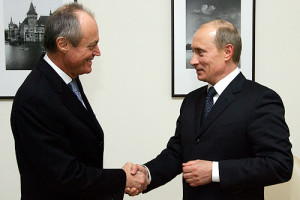The Other Breakaway Territories
 International outrage against Russia continues to grow as the death count rises in Ukraine and President Putin refuses to revoke his support for separatists in the east. With all eyes on Ukraine, however, few have taken notice of Russia’s latest moves to solidify its influence over breakaway regions elsewhere in the post-Soviet space. Whereas Putin has not been shy about using force in Ukraine, recent treaties with Georgian breakaway regions Abkhazia and South Ossetia have demonstrated the Kremlin’s aim to consolidate full control over these territories via a more subtle method of creeping de facto integration.
International outrage against Russia continues to grow as the death count rises in Ukraine and President Putin refuses to revoke his support for separatists in the east. With all eyes on Ukraine, however, few have taken notice of Russia’s latest moves to solidify its influence over breakaway regions elsewhere in the post-Soviet space. Whereas Putin has not been shy about using force in Ukraine, recent treaties with Georgian breakaway regions Abkhazia and South Ossetia have demonstrated the Kremlin’s aim to consolidate full control over these territories via a more subtle method of creeping de facto integration.
Signed on November 24th, Abkhazia’s “Treaty on Alliance and Strategic Partnership” with Russia signaled a more intimate relationship between the two governments than ever before. The treaty agrees to a shared “social and economic space” with Russia, including a “joint information-coordination center of the organs of internal affairs.” It also includes provisions for “a coordinated foreign policy” and “creation of a common defense and security space” that involves a “united group of forces” in the Abkhaz and Russian militaries. The Georgian government has strongly denounced this treaty as outrageous and illegitimate, as it amounts to a de facto annexation of the state’s sovereign territory no less egregious than what happened in Crimea. Abkhaz authorities, who uphold the notion of Abkhazia as an independent state, also complain that the treaty “in many places” amounts to a “loss of sovereignty.” The Abkhaz rejected the first version of the treaty proposed by Russia, arguing that it amounted to a wholesale “integration” with the Russian state. The new version that has been ratified by Abkhaz and Russian governments, while providing a few token marks of Abkhaz sovereignty, is hardly an improvement.
The “Treaty of Alliance and Integration” that Russia signed with South Ossetia this January was even more blatant. Whereas the Abkhaz continue to seek a measure of independence from Moscow, South Ossetia has openly voiced its desire to unite with Russia. Accordingly, the treaty will cause South Ossetia to forfeit all control over its armed forces, security services and trade policy to Russian authorities. The ratification of final versions of the treaties was met with high popular support in both territories, if for no other reason than that Moscow promised to extend Russian-level pensions to local citizens.
Both treaties were drafted after Georgia signed its own EU Association Agreement over the summer, leading analysts such as Thomas de Waal to conclude that these de facto annexations by Russia are “meant to be symbols to other former Soviet states of the price of integrating with the West.” Furthermore, it appears that Moscow has been able to effect these de facto annexations without negative consequence, as the obscure treaty negotiations took place under the radar of Western media that was focused on dramatic events in Ukraine. Whether on the battlefield in Ukraine or in closed-door treaty negotiations in Georgia, Putin has demonstrated that his aim to extend and solidify Russian dominance beyond state borders is both formidable and making tangible gains.
This narrative of unstoppable Putinist expansion begins to show cracks when we examine the case of Transnistria, however. This breakaway region within the borders of Moldova has lately received mixed messages from its Russian protectorate, which has been increasingly distant and unreliable as of late. Last month, Russia announced that it would not provide its traditional package of financial aid to Transnistria, nor would it extend its usual natural gas subsidy. These measures threaten to crush the region’s weak economy, which has already endured a prolonged state of budgetary crisis. The resulting vulnerability and political uncertainty in Transnistria caused by Russia’s pullout has been heralded by some in the West as a unique opportunity for the central Moldovan government to entice Transnistria back into the fold. Also a signatory of the EU Association Agreement, Moldova’s enhanced access to European markets is very attractive to struggling Transnistrian industries during their time of crisis.
As explanation for the unprecedented aid cuts, the Kremlin has cited Russia’s current economic crisis and the expenses incurred by activities in Ukraine. This raises some eyebrows, given that Russia’s economic assurances to Abkhazia and South Ossetia, including pension extension, were major incentives for the territories’ forfeiture of sovereignty in the recent treaties. Looking at the whole picture, it appears as if Russia is pulling funds from one illegal protectorate in order to aid the consolidation of another.
None of this bodes well for Russia’s grand expansionist policy, which is already showing serious signs of overextension even as it begins to build up momentum. And, as sanctions hold and the price of oil continues to drop, it doesn’t appear that the situation in the Russian economy is going to improve any time soon. Whether he likes it or not, Putin must soon realize that the resources at his disposal are finite, and not nearly adequate to keep up with the demands of his insatiable expansionist appetite.
